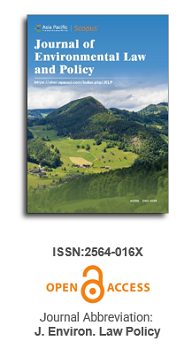
Asia Pacific Academy of Science Pte. Ltd. (APACSCI) specializes in international journal publishing. APACSCI adopts the open access publishing model and provides an important communication bridge for academic groups whose interest fields include engineering, technology, medicine, computer, mathematics, agriculture and forestry, and environment.
Soft law governance of enterprise data compliance in the context of environmental protection
Vol 5, Issue 2, 2025
Download PDF
Abstract
Domestic and foreign countries have different views on soft law governance. In China, the understanding of “soft law” stays at a static level, which is considered to be a social norm in a pluralistic sense. Foreign countries understand “soft law” from a dynamic perspective, that is, they mainly tend to take it as a means of governance and a mechanism to solve disputes and contradictions. Combining the above two viewpoints, soft law governance can be understood as a governance concept or governance model, and it takes the needs of the governance object as the starting point. Moreover, it advocates bottom-up governance. This governance method reflects the value connotation of people-oriented, democratic, autonomous and inclusive, and actively practices “multi-subject participation”. It can be seen that, rather than hard law, soft law is more suitable for the liquidity, development and change characteristics of enterprise data, especially in the context of environmental-related data, and is conducive to condensing the governance force of multiple subjects including the government. The effectiveness of enterprise data compliance governance is of great significance in the field of environmental protection. With the help of ecological environment data such as carbon emission data, environmental detection data and pollution control data, the efficiency and benefit of ecological environment governance can be improved, and the efficiency of ecological governance can be driven by data. But compared with the United States, the European Union and Singapore, the effect of enterprise data compliance soft law governance is not significant. Through literature research and comparative analysis, the factors affecting the effectiveness of Chinese soft law in enterprise data compliance governance are analyzed, and the solutions can be found from the comparative analysis.
Keywords
References
1. Schonberger VM, Ramge T. A big choice for big tech: share data or suffer the consequences. Foreign Affairs. 2018; 97(5): 48-54.
2. Wen YY, Zhang JY, Yu XL, et al. Trends in the global carbon emission carbon market and its impact on China (Chinese). China Investment (Chinese and English). 2024; (Z5): 70-74.
3. Zhang HY. The regulatory dilemma of carbon emission data outbound and China’s plan-with CBAM as the background (Chinese). Yangtze River Forum. 2024; (02): 45-56.
4. Ji JM.The great value, main problems and countermeasures of ecological environment big data governance-based on the practice of Zhejiang Province (Chinese). Journal of Beijing Jiaotong University (Social Science Edition). 2024; 23(04): 155-162.
5. Hu YL, Yao HL. Research on the multi-cooperative model of China’s GAI data governance: inspiration from Singapore’s governance experience (Chinese). Journal of Hohai University (Philosophy and Social Sciences Edition). 2024; 26(05): 86-98.
6. Zhang LH. What kind of “artificial intelligence law” does China need? The basic logic and institutional framework of artificial intelligence legislation in China (Chinese). Legal Science (Journal of Northwest University of Political Science and Law). 2024; 42(3): 3-17
7. Kuner C, Cate FH, Lynskey O, et al. Expanding the artificial intelligence-data protection debate. International Data Privacy Law. 2018; 8(4): 289-292. doi: 10.1093/idpl/ipy024
8. Ehrlich, Ye M, Yuan Z. Basic Principles of Sociology of Law. Beijing: China Social Science Press; 2009. p. 369.
9. Luo HC, Song GD. Taking seriously the general theory of soft law-public domain soft law and its practice in China (Chinese). Chinese Jurisprudence. 2006; (2): 3-24.
10. Wang L. Soft law governance of global digital financial regulation alienation (Chinese). Modern Jurisprudence. 2021; 43(03): 109-122.
11. Zhong XW. From algorithmic “black box” to algorithmic transparency: a dual legal governance model based on “hard law-soft law” (Chinese). China Maritime Law Research. 2023; 34(4): 53-62.
12. Zheng D. The rule of soft law in the service of generative artificial intelligence (Chinese). Wisdom of the rule of law. 2024; 2. “Eastern legal cutting-edge” research collection. School of Law, Nanjing Normal University. 53-69.
13. Zhou J, Rong S. Developed countries rely heavily on ‘heavy penalties’ to control smog (Chinese). Economic Reference. 2014; (8).
14. Zhou FG, Hou JL, Gao RD. ‘Paris Agreement’: A ‘soft law’ regulation in a ‘hard law’ environment (Chinese). Legal system and society. 2016; (25): 7-8+19.
15. Huang QZ. Practical problems and improvement paths of soft law governance of China’s network platform from the perspective of co-construction, co-governance and sharing (Chinese). Journal of China West Normal University (Philosophy and Social Sciences Edition). 2025; 1-12. doi: 10.16246/j.cnki.51-1674/c.20250314.001
16. Zeng X, Liang Z, Zhang H. Optimizing the soft law governance of artificial intelligence: from soft law first to soft law and hard law coordination (Chinese). E-Government. 2024; (6): 96-107.
17. Shen K. Autonomy, state coercion and soft law: Re-exploring the form and boundary of soft law (Chinese). Journal of Law. 2024; (11): 105-107.
18. Shen K. On the effectiveness and persuasiveness of soft law (Chinese). Journal of East China University of Political Science and Law. 2022; (04): 101-102.
19. Liu XH. On the soft law governance in the construction of the Belt and Road Initiative (Chinese). East China Law Journal. 2022; (5): 100-115.
20. Yan HY. Resolving the dilemma and building a system for enterprise data compliance (Chinese). Journal of Huazhong University of Science and Technology (Social Science Edition). 2024; 38(04): 36-45+71.
21. Shen K. Data Governance and Soft Law (Chinese). Financial Law. 2020; (1): 3-12.
22. Huang L. Research on the collaborative governance of soft and hard law for generative artificial intelligence training data (Chinese). Journal of Ningxia University (Social Science Edition). 2024; 46(01): 112-121+136.
23. Wang HY, Zhong Y. On the Soft Law Governance of Internet Finance (Chinese). Modern Jurisprudence. 2017; 39(06): 94-105.
24. Lei HN. Competitive risks, regulatory logic and antitrust response of generative artificial intelligence. (Chinese) China Science and Technology Forum. 2024; (07): 64-74.
25. Wu DS, Feng YY, Zhang HY, et al. Research Group of the Sub-project of the Major Consulting Project of the Chinese Academy of Sciences. Strategic Research on Information Technology Supporting Data Governance Modernization. Key Support for Data Governance Modernization (Chinese). National Governance. 2023; (13): 34-38.
26. Wu CH, Huang JY. The expansion of the EU data governance model and China’s response. (Chinese). Science and Technology and Law (Chinese and English). 2024; (06): 34-43.
27. Yan DX, Gao HX. “Soft law” first: the motivations, challenges and prospects of the Biden administration’s artificial intelligence governance. (Chinese). Contemporary World and Socialism. 2024; (04): 128-137.
28. Zhou X, Gu Y, Chen WD, et al. Research on influencing factors and driving-dependency mechanism of government data collaborative governance (Chinese). Information Science. 2024; 1-22.
29. Internet Law Research Center of ICTY. The EU and Singapore completed negotiations on a digital trade agreement (Chinese). Available online: http://chinawto.mofcom.gov.cn/article/e/t/202409/20240903533883.shtml (accessed on 13 February 2025).
30. Microsoft Responsible AI. Principles and approach. Available online: https://www.microsoft.com/en-us/ai/principles-and-approach (accessed on 13 February 2025).
31. Jiang QP. EU’s Digital Economy Regulation (Chinese). Available online: http://ip.people.com.cn/GB/n1/2020/0414/c136655-31672762.html (accessed on 13 February 2025).
32. Zhou WH. Research on Singapore’s data governance system and its implications (Chinese). Modern Intelligence. 2024; 1-16.
33. Chi SY, Du AQ. International trends and construction models of agile governance of generative artificial intelligence (Chinese). Journal of Intelligent Science and Technology. 2024; 6(03): 402-412.
34. Zhao WY. Corporate law design of compliance system and its implementation path. (Chinese). China Legal Science. 2020; (2): 69-88.
35. Long L. Problems and countermeasures of soft law governance of artificial intelligence under the concept of agile governance (Chinese). Jianghan Forum. 2024; (05): 128-134.
Refbacks
- There are currently no refbacks.
Copyright (c) 2025 Author(s)
License URL: https://creativecommons.org/licenses/by/4.0/

This site is licensed under a Creative Commons Attribution 4.0 International License (CC BY 4.0).

University of Lapland, Finland

Yaroslav Mudryi National Law University, Ukraine
-
-
-
Scopus (CiteScore: 0.5)
-
EBSCO
-
HEINONLINE
-
Crossref
-
Publons
-
ROAD
-
WorldCat
-
J-Gate
-
Scilit
-
EuroPub
-
SSRN
-
Index of Copernicus
-
CiteFactor
-
Dimensions
-
DRJI
-
Zenodo
-
TrendMD
-
OpenAIRE
-
-

